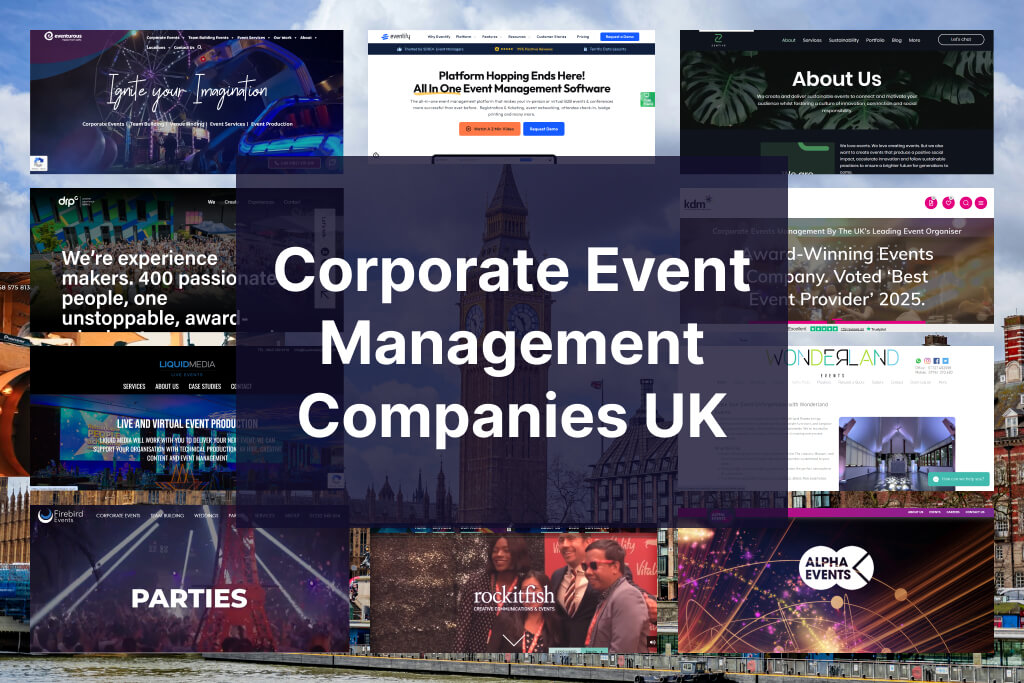Key Takeaways
- The events industry is booming, as it is projected to grow from $736.8 billion in 2021 to $2.5 trillion by 2035.
- 80% of attendees consider in-person events the most impactful marketing channel, though hybrid formats are expanding reach and reducing carbon emissions by up to 50%.
- 53% of organizations spend more on attending or sponsoring events than hosting(43%), while inflation and rising venue costs remain top challenges for planners.
- 64% of attendees prioritize personalised and immersive experiences, and 85% are more likely to recommend events with excellent customer service.
- The event tech market is projected to hit $107.28 billion by 2037, as technology and AI are shaping the events industry.
According to Allied Market Research, the global events industry, valued at $736.8 billion in 2021, is projected to reach $2.5 trillion by 2035, growing at a compounded annual growth rate of 6.8% from 2024 to 2035. This indicates that event marketing is a massive ROI that you can hugely profit from with the right skillset and strategies. Despite event cancellations and pivots in the past years, especially with the onset of COVID-19, the events industry has re-emerged to become vital touchpoints for brands that want to build loyal communities and stay ahead.
While we live in a digital-centered world, any brand that can create highly immersive, impactful, and audience-centered events will cut through the marketing noise and connect with its audience in a way that social media ads and email campaigns cannot. It is therefore not surprising that 78% of event organisers identify in-person events as their most impactful marketing channels, which will further be shaped by AI-powered personalisation, technology, and sustainability.
However, in a rapidly growing sector like the events industry, guesses and whims aren’t enough to develop winning strategies. Whether you are an events organiser, business owner, or marketer, you need accurate, up-to-date data to help you plan your moves. You need to know who your audience is, what they want, how you can provide it through your event, what will make you stand out from the competitors, etc. Data-backed strategies ensure that you not only recoup every dollar invested in your event marketing activities but also get returns.
That said, we have compiled this report of accurate, relevant, and most recent event marketing statistics to guide your decisions from what attendees want to budget & spend trends to how technology and AI are shaping the events industry. The numbers in this report will give you a clear picture of the events industry currently, where it’s headed, and how you can take advantage.
The Current State of Affairs of the Global Events Industry
Here are some general insights about the current state of the events industry;
- The events industry is projected to reach $2.5 trillion by 2035, growing at a compounded annual growth rate (CAGR) of 6.8% from 2024 to 2035.
- The event market industry from 21 to 40 years old accounted for the largest revenue share in 2021 due to their engagements in different events such as exhibitions, conferences, music concerts, etc.
- The entertainment sector dominated the market in 2023 and is expected to continue till 2035.
- Research shows that 84% of attendees prefer musical or musical-themed events, 78% prefer live performing arts, 67% prefer sports events, 65% prefer charity events, and 58% prefer marathon runs.
- The event management software market size, valued at $6.63 billion in 2018, is projected to reach $16.11 billion by 2026 and expand to $28.13 billion by 2031.
- The global corporate events market is expected to grow from $325 billion to $595.27 billion by 2029 at a CAGR of 10.61%.
- North America dominates the global corporate events market, accounting for a revenue share of 35% in 2023.
- 84% of marketers say events help their company stand out from the competition, 83% say business events are vital for their growth, and 77% say events are the most impactful marketing channel for their company.
- On average, 14% of marketing budgets go toward event marketing.
- The global experiential marketing service market, valued at $52.18 billion in 2024, is projected to $53.83 billion in 2025 and grow to $69.04 billion in 2033, at a CAGR of 3.1% from 2025 to 2033.
.jpg)
In-person vs. Virtual vs. Hybrid Events Trends in the Events Industry
- The virtual event marketing industry is projected to grow from $226.75 billion in 2025 to $ 744.41 billion by 2034, at a compound annual growth rate (CAGR) of 14.12% from 2025 to 2034.
- 74% of businesses say virtual events are essential to their overall marketing strategy.
- Virtual events dominated 2023, outpacing hybrid and in-person events. 73% of marketers rated virtual events as a top priority, deeming them either “important” or a “must-have.”
- 80% of respondents say in-person events are their most trusted marketing channels.
- 63% of organisers say attendees want micro-events and intimate gatherings.
- 70% of attendees say in-person events provide the best training and professional content.
- 80% of attendees say in-person events are the most reliable way to find the best products and services.
- 59% of event organisers think that virtual events are now a permanent part of their plan.
- 23% of marketers use virtual events as part of their marketing plans.
- 49% of event organisers prefer a mix of in-person and virtual features in their events.
- 61% of organisers find hybrid events more cost-effective than in-person gatherings.
- Hybrid events can reduce carbon emissions up to 30%, compared to in-person gatherings alone.
- 80% of event managers believe that hybrid events have greater reach and engagement compared to other event types.
.jpg)
Budget & Spend Trends in the Events Industry
- 53% of organizations now spend more on sponsoring and attending events than hosting them (47%).
- The cost per meeting attendee per day is expected to rise 4.3% to $169 in 2025. In 2023, the average daily cost per attendee fell to $155, down from $160 in 2022, a -3.1% decline.
- 65% of corporate event budgets are allocated to venue and food costs.
- The average spend per attendee at a corporate event is $150.
- 78% of event planners say budget constraints are the biggest challenge they face.
- 39% of meeting planners saw budget increases in 2024, and 57% of these increases fell between 10% and 20%.
- Nearly 80% of planners now face challenges with accommodation rates most or all of the time, while over 70% struggle with unexpectedly high AV costs.
- 78% of event attendees say they’re willing to spend as much or more on event tickets in 2024 as they did in the past, even with inflation driving prices up.
- Food and beverage sales are the biggest revenue driver for organizers after ticket sales.
Attendees Wants & Demands for Events Organizers
- 64% of attendees say immersive experiences are the most important element of the event experience.
- 38% of attendees want to feel informed after keynotes, and 35% want to feel inspired or motivated.
- 39% of attendees want to hear keynotes about innovation, while 34% prefer keynotes from industry leaders and experts.
- 68.7% of event professionals agree that using technology to improve the attendee experience is a trend with staying power.
- About 82% of convention attendees use mobile devices during the event
- Nearly 60% of attendees say networking opportunities influence their choice to attend a convention
- Post-event surveys indicate that 72% of attendees are interested in future events based on their experience
- 49% of marketers say audience engagement is the biggest contributing factor to having a successful event.
- Event professionals highlight three key elements that contribute to a memorable experience - content (38%), venue (27%), and destination (25%).
- 80% of event attendees consider exhibitors and vendors as key to a positive experience.
- 67% of consumers say that a personalized customer experience influences their likelihood to return to an event.
- 85% of attendees are more likely to recommend an event with excellent customer service.
- 80% of event attendees consider exhibitors and vendors as key to a positive experience.
- 90% of event attendees believe that good food and beverages are integral to positive experiences.
- 66% of event visitors report that touchless check-in systems positively impact their experience
- 86% of consumers are willing to pay more for a better customer experience in events.
- The top 3 sessions attendees look forward to are expert Q&As (47%), Demos (38%), and virtual happy hours (33%).
.jpg)
Technology & AI Trends Shaping the Event Industry
- The global event management software market size was valued at $14.37 billion in 2025 and is expected to reach $107.28 billion by 2037, at a CAGR of 17.7%.
- 25% of large enterprises use six or more B2B event technology solutions, spending over $250,000 per annum in the process.
- Over 85% of event planners use event management software.
- 67.4% of organizers say they have changed or plan to change their event management software vendor within the next year.
- 65% of event planners say they will use technologies like onsite check-in tools (53%), QR codes (49%), artificial intelligence (42%), and virtual reality (40%) to maximize the associated opportunities.
- 19% of marketers rely on 4–7 different event technology providers to meet their needs, which eats up time and resources.
- 52% of event tech startups now incorporate AI features in their platforms
- 58% of event organizers increased their use of AI tools after the pandemic
- 68.9% of event organizers report that event software positively impacts their events’ success, while 90% of professionals believe technology enhances event success.
- The global event industry is expected to save over $15 billion annually through AI automation by 2025, while AI-powered analytics help improve event ROI by up to 30%.
- 80% of event attendees prefer personalized event experiences powered by AI.
- 58% of event sponsors utilize AI to optimize activation performance metrics
- 77% of virtual event platforms now offer AI-based matchmaking features
- 58% of respondents say AI improves attendee engagement during events
- AI-enabled virtual reality experiences at events increased attendee satisfaction scores by 40%.
- 65% of event professionals believe AI will significantly impact the events industry in the next five years
- 75% of event companies plan to increase their AI budget over the next year.
Social Media, Email & Community Building Trends Shaping the Event Industry
.jpg)
- Event marketing is the second largest expenditure for businesses, after online advertising (19%), branding (13%), content marketing (12%), and offline advertising (11%).
- Emails deliver an average ROI of $42 for every $1 spent.
- Personalized event emails perform up to 6x better than generic blasts.
- Viewers are 95% more likely to remember calls to action from our systematic video approach compared to 10% from text-based content.
- The average open rate for email marketing is around 20%.
- 63% of emails are opened on mobile devices.
- 40% of marketers consider email marketing to be the most effective channel for promoting an event.
- 61% of people prefer to be contacted by brands through email, and 99% of users check their emails daily.
- 87% of company leaders say email marketing is critical to their company’s success.
- 80% of B2B leads from social media come from LinkedIn, making it a good fit for promoting business events.
- 79% of event marketers use LinkedIn to market their events.
- Facebook is the top social media platform for marketing, with 86% of marketing professionals leveraging the platform
- Instagram is the second-most used social media platform among marketers, as 79% see it as part of their social media marketing mix
- 91% of B2C marketers use Facebook, an even higher share than among B2B marketers (83%).
- 86% of B2C marketers use Instagram, making it the second most popular platform and showing its strength in visual and lifestyle-driven content.
DEI & Sustainability Trends in the Events Industry
- 80% of planners say their organizations regard sustainability when planning events.
- 81% of planners say their organizations incorporate a Diversity, Equity & Inclusion strategy into events by choosing diverse speakers and working with diverse or minority-owned suppliers.
- 42% of attendees consider sustainability practices when deciding whether to attend an event.
- 76% of organizations have a defined sustainable meeting program strategy in place.
- Including sustainability practices in request for proposals (RFPs) is the most popular new sustainable approach in the events industry.
- 80% of organizers are adopting eco-friendly measures, and projections show the market’s growth to $18 billion by 2027.
- 85% of consumers prefer to buy from brands that demonstrate environmental responsibility.
- 70% of event attendees want to see more eco-friendly practices at events.
- 80% of event organizers report implementing sustainable practices in some capacity.
- 75% of industry reports indicate a shift towards tangible and documented sustainable actions.
- 58% of event organizers use digital tickets and registration to reduce paper waste.
- 52% of event venues have switched to low-energy appliances and fixtures to enhance sustainability.
- Virtual and hybrid events reduce carbon emissions by an average of 20-50% compared to traditional events.
- 77% of event attendees expressed a willingness to pay more for sustainable event options.
B2B vs. B2C Events Trends in the Events Industry
- 51% of B2B companies use their business partners (channel) to drive registrations.
- B2B marketers mostly target decision-makers for their virtual events, while 48% of businesses organise between 20 and 30 virtual events annually.
- 77% of B2B buyers are more likely to engage with companies that understand their needs through personalized experiences
- B2B marketers say in-person events (52%) and webinars (51%) are the most effective distribution channels, followed by email (42%), organic social media platforms (42%), blogs on corporate websites (41%), and email newsletters (37%).
- B2B events comprise the largest portion of the event marketing industry, with a 40% share, whereas B2C and other events together have a share of 60%.
- B2B event organisers and vendors prefer meetups/networking opportunities (55%), webinars (47%), in-person roundtables/forums (46%), online roundtables/forums (45%), and podcasts (32%).
- B2B events generate $1.1 trillion in direct spending globally.
- 57% of B2C marketers and 55% of B2B marketers plan to execute more events in 2025 compared to 2024.
Data-Driven Strategy & Future Trends Shaping the Events Industry
- 74% of Fortune 1000 companies plan to increase their events budget in 2025.
- 66% of corporate event professionals anticipate increased budgets.
- 68 % of organizers say keeping attendees engaged after the livestream ends is their biggest challenge.
- Brands using ELG (Event-Led Growth) are noticing benefits like better brand visibility (63%), stronger customer relationships (63%), and stronger or new partnerships (52%).
- 89% of marketing decision-makers consider personalization essential for their business's success over the next three years.
- While 85% of companies believe they provide personalized experiences, only 60% of customers agree.
- 75% of company executives view personalization as essential for digital experiences.
- 27% of marketers believe data is the key obstacle to personalization.
- 73% of customers expect better personalisation as technology advances.
- 65% of customers expect companies to adapt to their changing needs and preferences, but 61% of customers say most companies treat them as a number.
- 80% of customers say the experience a company provides is as important as its products and services.
- The customer experience and personalization software industry is projected to reach $11.6 billion by 2026 from $7.6 billion in 2021.
- 73% of business leaders agree that AI will fundamentally reshape personalization strategies.
- Over 92% of businesses are leveraging AI-driven personalization to drive growth.
- 50% of meeting planners use AI to plan and execute events, 42% use AI or plan to use it for attendee matchmaking, 41% for content creation with AI writing assistants, and 39% for tracking attendee engagement.
- 95% of meetings professionals believe AI will not cause job losses, but 50% report that upskilling will be required to adapt to AI-powered changes.
- 73% of consumers prefer short-form videos to learn about products or services.
- 47% of marketers say short-form videos are more likely to go viral.
- The global Immersive Entertainment market was valued at $133.6 billion in 2024 and is projected to reach $473.9 billion by 2030, at a CAGR of 23.5% from 2024 to 2030.
Conclusion
The event professionals who get the best results are those who convert accurate data into marketing insights to achieve their business goals. Whether it’s learning what attendees want, integrating sustainability and inclusion practices into your plans, or leveraging Extended Reality for immersive experiences, your event marketing strategy must incorporate these essential trends shaping events in 2025 and beyond.
You can turn this data into tangible results by understanding, interpreting, and considering its influence as you make your decisions. It isn’t to be treated as an afterthought, or else you would incur avoidable losses. For instance, the data on attendees' engagement can guide decisions on the types of marketing channels to use, venue selection, event structure, etc. The data on hybrid engagement can inform decisions on live streaming, polls, real-time check-ins, etc., to ensure virtual audiences are carried along during your event.
With Eventify’s all-in-one event management solution, you can combine this data with the right tools and processes to enable you to organise events that satisfy your attendees, generate quality leads, and achieve your brand goals. Reach out to us today!






.png)





